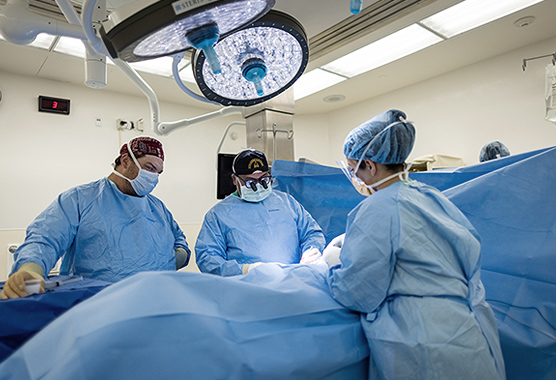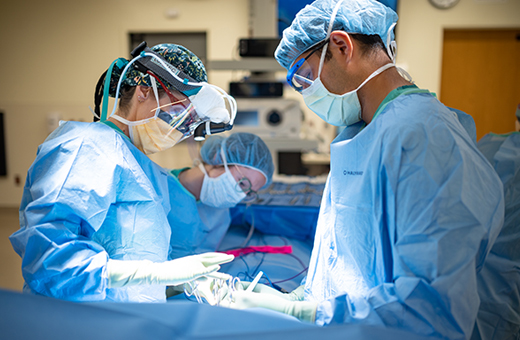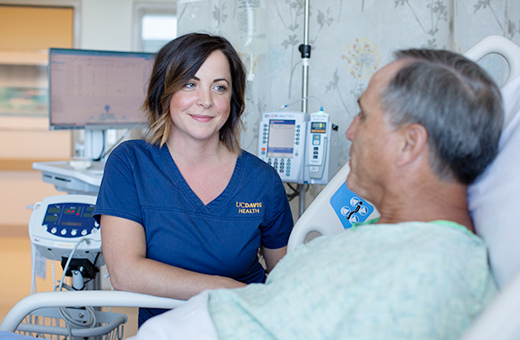Hepatobiliary Surgery
Our specialty-trained surgeons perform complex hepatobiliary surgeries involving multiple organs. Each procedure is unique, and we take a personalized approach with your quality of life in mind.
Medically reviewed by Lea Matsuoka, M.D. on Nov. 28, 2023.

Comprehensive Care With a Team Approach
Hepatobiliary surgery includes procedures involving your bile ducts, gallbladder, liver or pancreas. You may need this type of surgery because of a blockage or disease. These surgeries are often part of a cancer treatment plan.
Specialists at UC Davis Hepatobiliary Surgery Program work closely with our award-winning Comprehensive Cancer Center oncologists to offer you the best care. We offer the widest range of hepatobiliary services in our region.
Types of Hepatobiliary Surgeries
We offer expertise in all types of hepatobiliary procedures. We are passionate about preventing the return of disease and giving you the best quality of life.
Bile Duct Surgeries
Bile is a digestive fluid your liver makes. Bile ducts are small tubes that carry bile within and out of your liver. We treat all types of bile duct conditions. Surgeries we offer include bile duct resection, bile duct stone removal and biliary stent placement.
Gallbladder Surgery
We perform laparoscopic surgery for gallbladder removal (cholecystectomy) or gallstone removal. With this minimally invasive procedure, your hospital stay may be less than 24 hours, and your recovery is faster than with other methods.
Liver Surgery
Pancreas Surgery
Our specialists have expertise in a range of pancreatic surgery techniques. These include removing the whole pancreas, part of the pancreas, or part of the pancreas as well as parts of nearby organs.
Whipple Procedure
This pancreatic cancer treatment involves removing parts of your gallbladder, pancreas, small intestine and stomach. It leaves part of your pancreas, so you still get the benefit of the digestive enzymes and insulin this organ produces.
Request an Appointment
As Sacramento's No. 1 hospital, you'll benefit from unique advantages in primary care and specialty care. This includes prevention, diagnosis and treatment options from experts in 150 specialties.
Referring Physicians
To refer a patient, submit an electronic referral form or call.
800-4-UCDAVIS
Patients
Call to make an appointment.
Consumer Resource Center
800-2-UCDAVIS
Before you have any type of hepatobiliary procedure, your surgeon will talk to you about the surgery and how to prepare. It is important to follow your surgeon’s instructions before your surgery to minimize the chance of complications.
-

Before Hepatobiliary Surgery
Your care team will tell you how to prepare the night before and day of surgery. You may need to stop taking some medications for a period of time. You may need scans or blood tests before surgery.
-

During Hepatobiliary Surgery
You may get medication to help you relax. Before the procedure begins, you will receive anesthesia. You will be asleep during the surgery, and you will not feel any pain.
-

After Hepatobiliary Surgery
After your procedure, you will rest in a recovery room until the anesthesia wears off and you wake up. You will stay in the hospital overnight or longer. The length of your stay depends on the type of procedure you have, your overall health and if there are any complications.
Home Care After Hepatobiliary Surgery
When you get home after surgery, you will need to rest for several days. You may not be able to return to work or your usual activities for up to three months, depending on the type of procedure you have. Your care team will give you complete home care instructions.
Eat Healthy Meals
After surgery, your body needs nutrients to heal and recover. You may feel nauseous right after your procedure. It is important to begin eating regular meals when you feel up to it. Eat balanced meals with plenty of protein.
Follow Instructions for Medications
If you stopped taking any medications before surgery, your care team will tell you when to start them again. You also may have medications to help with pain after surgery.
Help Recovery by Walking
Your care team will let you know when to begin light activity. When you are well enough, daily walks or other gentle movement can help you recover. Be sure to rest when you are tired.
When to Contact Your Surgeon
Contact your surgeon if you have bleeding from your incision, fever, swelling or pain in your stomach or swelling in your legs.

Ranked among the nation’s best hospitals
A U.S. News & World Report best hospital in cardiology, heart & vascular surgery, diabetes & endocrinology, ENT, geriatrics, neurology & neurosurgery, and pulmonology & lung surgery.

Ranked among the nation’s best children’s hospitals
U.S. News & World Report ranked UC Davis Children’s Hospital among the best in pediatric nephrology, orthopedics*, and pulmonology & lung surgery. (*Together with Shriners Children’s Northern California)

Ranked Sacramento’s #1 hospital
Ranked Sacramento’s #1 hospital by U.S. News, and high-performing in aortic valve surgery, back surgery (spinal fusion), COPD, colon cancer surgery, diabetes, gynecological cancer surgery, heart arrhythmia, heart failure, kidney failure, leukemia, lymphoma & myeloma, lung cancer surgery, pacemaker implantation, pneumonia, prostate cancer surgery, stroke, TAVR, cancer, orthopedics, gastroenterology & GI surgery, and urology.

The nation’s highest nursing honor
UC Davis Medical Center has received Magnet® recognition, the nation’s highest honor for nursing excellence.

World-class cancer care
One of ~59 U.S. cancer centers designated “comprehensive” by the National Cancer Institute.

A leader in health care equality
For the 13th consecutive year, UC Davis Medical Center has been recognized as an LGBTQ+ Healthcare Equality Leader by the educational arm of America’s largest civil rights organization.

